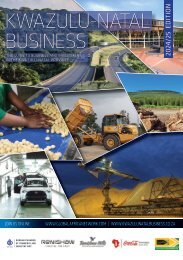Eastern Cape Business 2017 edition
The 2017 edition of Eastern Cape Business is the 10th issue of this highly successful publication that, since its launch in 2006, has established itself as the premier business and investment guide to the Eastern Cape Province. The Eastern Cape enjoys an abundance of natural and human resources, as well as established industrial infrastructure that drives the economy of the province. This includes three ports and two industrial development zones which are home to a wide range of manufacturers and exporters. The 2017 edition includes an in-depth look at the province’s two Industrial Development Zones, a focus on skills development and investment climate information from the Nelson Mandela Business Chamber and the Border-Kei Chamber of Business.
The 2017 edition of Eastern Cape Business is the 10th issue of this highly successful publication that, since its launch in 2006, has established itself as the premier business and investment guide to the Eastern Cape Province. The Eastern Cape enjoys an abundance of natural and human resources, as well as established industrial infrastructure that drives the economy of the province. This includes three ports and two industrial development zones which are home to a wide range of manufacturers and exporters.
The 2017 edition includes an in-depth look at the province’s two Industrial Development Zones, a focus on skills development and investment climate information from the Nelson Mandela Business Chamber and the Border-Kei Chamber of Business.
Create successful ePaper yourself
Turn your PDF publications into a flip-book with our unique Google optimized e-Paper software.
SPECIAL FEATURE<br />
from the east offloading their containers destined<br />
for destinations in the Americas rather than taking<br />
them all the way there, for the containers to be picked<br />
up by other ships.<br />
The capabilities of the region’s workforce, particularly<br />
in the automotive and automotive parts sector,<br />
could be attractive to repairers and manufacturers<br />
in marine sub-sectors.<br />
Coastal research capabilities<br />
The Phakisa strategy envisages that Technical<br />
Vocational Education and Training (TVET) colleges<br />
will largely be responsible for developing skills<br />
in the maritime sector but the Nelson Mandela<br />
Metropolitan University (NMMU) in Port Elizabeth is<br />
positioning itself to play a critical role.<br />
In June 2016 a seminar was arranged by the<br />
Oceans Economy Secretariat, under the Department<br />
of Environmental Affairs. With the aim of creating a<br />
“national maritime cluster”, the event was co-hosted<br />
by NMMU, the South Africa Maritime Safety Authority<br />
(SAMSA), the South African International Maritime<br />
Institute (SAIMI) and the Norwegian Embassy in<br />
Pretoria.<br />
Norwegian diplomats, experts and business<br />
leaders were on hand to share their expertise in the<br />
maritime economy, a central part of the Norwegian<br />
experience. Sectors represented included cargo,<br />
shipping, marine manufacturing, finance institutions,<br />
academia, government and potential<br />
investors.<br />
In September 2016 the university hosted the inaugural<br />
South African Oceans Economy Symposium.<br />
The conference was called “Investing in blue growth<br />
and sustainable solutions for Southern Oceans:<br />
Lessons from Nordic countries”.<br />
A direct spin-off from this conference was the<br />
visit later in the year of a delegation of Finnish and<br />
Estonian diplomats and business leaders, eager to<br />
find out more about investment opportunities in the<br />
Nelson Mandela Bay metro and in the <strong>Eastern</strong> <strong>Cape</strong>.<br />
NMMU is creating a campus for Ocean Sciences<br />
and already has several institutions and research<br />
chairs in place. These include a unit aimed at combating<br />
sea fisheries crime (FishFORCE, with support<br />
from Norway) and the South African International<br />
Maritime Institute. The university has four marine<br />
sector chairs funded by the South African Research<br />
Chair Initiative (SARChI) and the National Research<br />
Foundation (NRF):<br />
• Marine Spatial Planning (ocean zoning)<br />
• Shallow Water Ecosystems (including rare coastal<br />
rock pools)<br />
• Ocean Sciences and Food Security (with<br />
Southampton University)<br />
• Law of the Sea (including oil resource management,<br />
port law and marine tourism law).<br />
Transnet’s Maritime School of Excellence offers<br />
specialised training at four campuses across South<br />
Africa, one of which is in Port Elizabeth. In 2016, 81<br />
students graduated from the <strong>Eastern</strong> <strong>Cape</strong> facility<br />
and can now be deployed to Transnet Port Terminals<br />
or Transnet National Ports Authority facilities.<br />
Transnet has been intensifying its training<br />
programmes in recent years. Training is offered<br />
in port engineering, terminal operations,<br />
marine operations, port management and<br />
other specialised training specific to the marine<br />
environment, including: marine pilots, tug<br />
masters, engineers and crane and straddle-gantry<br />
operators.<br />
13 EASTERN CAPE BUSINESS <strong>2017</strong>


















